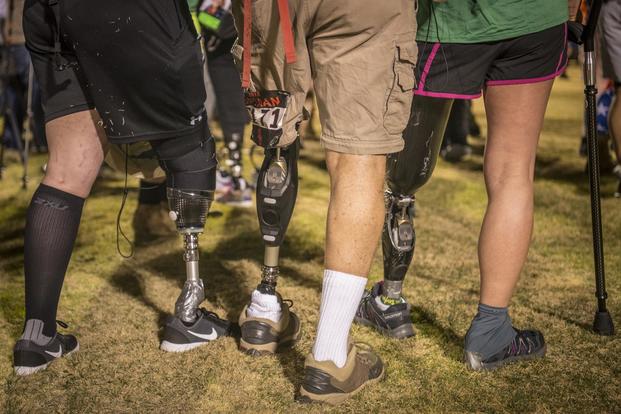The coronavirus pandemic is hitting wounded veterans especially hard, with many reporting deterioration of their mental and physical health, as well as their financial well-being, since the outbreak began, according to a new survey of Wounded Warrior Project members released Friday.
These veterans, however, also continue to see improvements in employment opportunities, education, housing and other quality-of-life measures despite having extensive physical injuries and mental health conditions such as depression and post-traumatic stress disorder at disproportional rates.
Read Next: Female Marine Drill Instructors are Headed for All Male San Diego Boot Camp
WWP's 11th annual membership survey, containing responses from 28,282 of the nonprofit's 121,981 members, paints a picture of the challenges facing injured post-9/11 veterans, as well as successes achieved over the past several years.
This year's survey shows a population that is seeing home ownership rise, from 55.5% in 2018 to nearly 59.9% in 2020, and educational opportunities increase, with more reporting earning a bachelor's degree in 2020 than previous years, from 35.8% in 2018 to 41.5% in 2020.
But unemployment also has skyrocketed among the group this year, and more than a third of the veterans expressed great concern that they "expect to run out of money for myself or my family's necessities" as a result of the COVID-19 pandemic.
The unemployment rate for wounded veterans jumped from 11.5% in 2019 to 16.2% this year, and more than 40% of respondents said they have had issues related to employment as a result of COVID-19.
The unemployment rate across the U.S. in May and June -- the months the survey was issued -- was 13.3% and 11.2%, respectively.
"This is certainly something we need to take a look at. ... As an institution [WWP] made an $11 million commitment to warriors for that exact reason. We were seeing that warriors were losing jobs, family members were losing jobs, so we needed to step in. We put together a grant process for warriors to apply for emergency funding to help keep their families afloat during this time of uncertainty," said Melanie Mousseau, director of metrics for WWP.
Post-traumatic stress disorder diagnoses among these veterans remained consistent across the population in the past year, with 82.8% reporting they have the condition -- the same as the previous year. Respondents reported a drop in sleep disturbances from last year, 83.6% down from 87.5%; in anxiety, 76.6% down from 80.7%; and depression, 72.4% from 76.5%.
Nearly half -- 48.9% -- said their physical health had worsened, and 51.9% said their mental health was worse during the pandemic, with more than 60% saying they felt more disconnected from family, friends or their community as a result of COVID-19.
More than two-thirds of male veterans and three-fourths of female veterans indicated they felt lonely. Nonetheless, nearly 80% said they had people they could depend on if they needed someone.
"The survey was administered in May and June when a lot of the physical distancing measures were in place across the country ... but the question specific to social support, that question is asked for them to consider it more long term," Mousseau said.
Other challenges facing this veteran population include dealing with the aftermath of sexual assault and harassment when they served in the military, and exposures related to deployments and combat.
According to the survey, 10.9% of respondents said they experienced some type of sexual abuse or harassment while serving, including nearly half of all female respondents. Nearly 61% of the women said they had been sexually harassed by another service member, Defense Department employee or contractor; and 44% said they had been sexually assaulted. In contrast, 4% of males said they had been harassed and 2% said they were sexually assaulted.
For the second year, the survey contained questions about battlefield exposures to toxic substances such as burn pits, chemical munitions and environmental pollution. Nearly 89% said they were "definitely or probably" exposed to toxic substances during service, and 16.1% reported receiving treatment for their exposure, up from 6.8% last year.
For the first time, the WWP survey asked about electronic games, which respondents said they spent hours a day playing. According to the report, male veterans spent 3.5 hours a day playing, while female veterans spent 3.1 hours a day outside work or school. Nearly half said they play because it helps them "forget their problems" or "escape reality." Roughly a third said they play because it calms them when they are angry.
Nearly all -- 95% -- of respondents to the survey are receiving disability compensation from the Department of Veterans Affairs and three-quarters have a VA disability rating of 80% or higher.
Just 6% of the respondents were active duty, and 20% were women.
The survey also found that:
- The majority of respondents, 71.9%, get their health care through the VA. But during the pandemic, 70% had physical health and 51.1% had mental health appointments canceled.
- 6.7% have tested positive for COVID-19.
- Cannabis use declined slightly over the past three years, with 16.3% reporting using it, down from 18% in 2018.
- Nearly 30% of respondents said they had difficulty getting mental health care, did not get the care they needed or put off care.
"We are actively involved in taking a deep dive into the survey as a whole," Mousseau said. "We are actively looking at what we are capturing, how we are capturing it, to make sure we are getting on top of [their] needs."
The full report is available on Wounded Warrior Project's website.
-- Patricia Kime can be reached at Patricia.Kime@Monster.com. Follow her on Twitter @patriciakime.
Related: Veteran Suicide Prevention Bills Will Move Forward After Committees Reach Compromise













